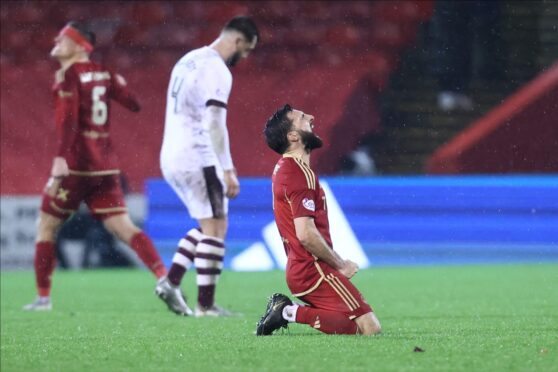To see Aberdeen’s captain sinking to his knees on the centre spot, fists aloft in celebration of a result which left his team ninth in the table, is to know much about the Dons’ campaign to date.
Since the advent calendars came out, the major suspense each morning has been over whether the headlines would describe Barry Robson as ‘beleaguered’ or ‘embattled’.
As the manager struggled to lever his team out through the dressing room door intact, most days it would turn out to be a chocolate teapot.
As he searches for number 11 today, Robson will be relieved that it now only describes the date and not his team’s league position.
He will also feel lighter for the team having unloaded what had become a notorious burden of non-resilience.
To lose 24 consecutive domestic matches in which their opponents had opened the scoring would be compelling evidence of a fundamental lack of recovery powers, but for its odd quirk of running alongside a European effort in which four draws were salvaged after conceding first, two of them from 2-0 behind.
In this case it is perhaps more indicative of a playing style likelier to find success against higher defensive lines.
That was certainly one decisive factor on Saturday, with the turning of another number 11 revealing an expanse behind Hearts’ atypically aggressive injury-time position.
But it also took commendable presence of mind.
It would have been understandable for a striker experiencing Duk’s season to have fixed his sights and commandeered the chance – as Ester Sokler had from the exact same spot half an hour earlier – so he is due much credit for seeing and delivering the match-winning pass.
At 1-0 down the Dons were staring at yet another L. Thank goodness it turned out to be Leighton Clarkson’s victory salute.


Conversation